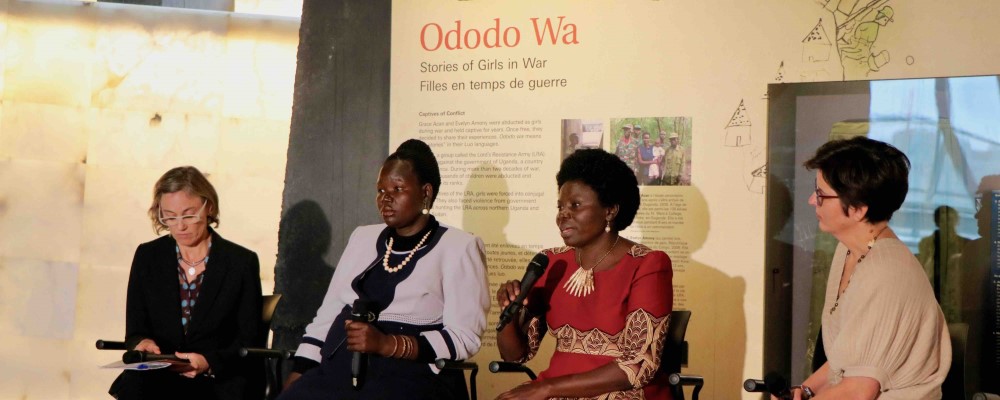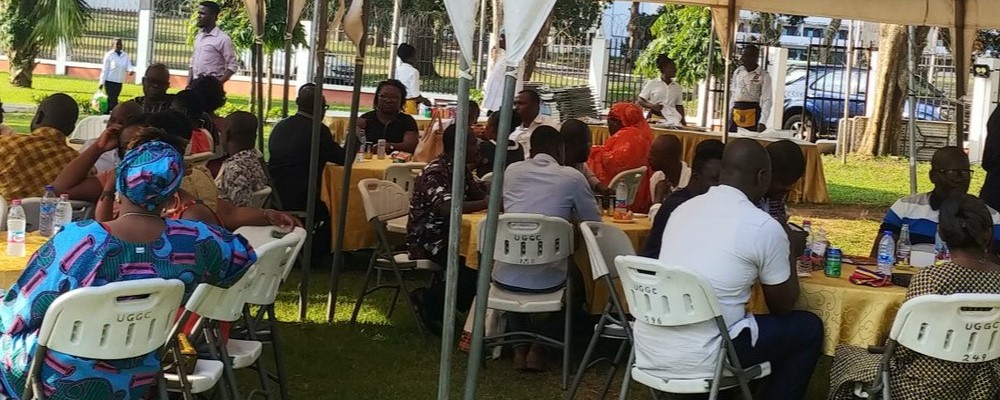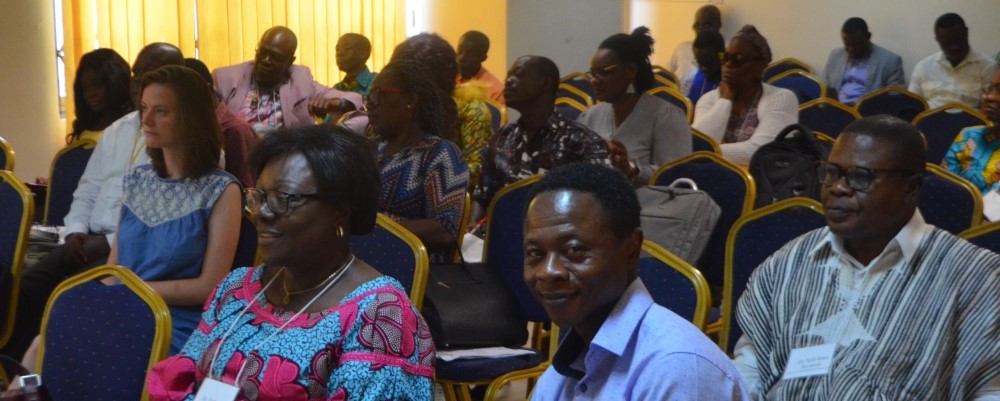Reflections on Repair, Responsibility, Resistance and Reform: New Pathways
The Centre for Reparation Research, The University of the West Indies & The Harriet Tubman Institute, York University
October 14 -17, 2025
Call for Papers
What traumas, distortions, rebellions and forms of repair must we calibrate within a world where centuries of intense colonisation and associated extractivist capitalism have attempted to erase millenia of sustainable traditional ways of being and knowing?
As we enter the second International Decade for People of African Descent (2025-2034), and acknowledge the International Decade of Indigenous Languages (2022-2032) we face a world defined by layered crises and persistent systemic inequities. Communities across the globe continue to grapple with the legacies of colonialism, racial injustice, economic inequality, and ecological degradation. This conference invites critical engagements and creative expressions that address the themes of repair, responsibility, resistance, and reform and how these principles can be, and have been, understood, embodied, and put into action. We seek to foreground not only what we do but how we do it, affirming methodologies and approaches that exemplify collective healing and social transformation through anticolonial, decolonial, and transformative lenses. We also recognise the significance of such approaches across fields of study and activism that have dominantly and traditionally obscured diverse expressions of Black life from across the globe - this includes queer, disability, and gender studies. This conference will be a space to not only critique but to dream, to strategise, and to act together.
In this pivotal moment, we invite scholars, activists, artists, and practitioners to contribute to a rich and interdisciplinary dialogue. Submissions should engage with the ways in which Africa and its diasporas have historically and contemporarily responded to structural oppression and propose innovative visions for a future grounded in justice, equity, and sustainability. We are particularly interested in work that moves beyond abstract theorization and grapples with actionable pathways for real-world transformation.
Let us collectively imagine and build extant realities and futures worthy of our ancestors’ sacrifices and our descendants’ hopes.
Conference Themes:
Repair and Responsibility: What does repair look like in a post-pandemic world, particularly in the context of communities and nations affected by colonialism, imperialism, and racial capitalism? What responsibilities do African nations, diasporic communities, and global powers have in addressing past wrongs and building a future of justice?
- Sub-themes include:
- Alternative Approaches/New Pathways to Repair
- Indigenous Knowledges for Repair
- The Politics of Responsibility
- An Ethic of Economic Repair: New Financial Orders
Response and Reform: How do African and diasporic communities respond to crises of identity, power, and survival? What kinds of reforms—both internal and external—are necessary to create systems of governance, social structures, and cultural practices that uphold dignity, equity, and sustainability? How can we move from theory to praxis in meaningful and impactful ways?
- Sub-themes include:
- Strategies for Black Wellness
- Health and Reparatory Justice
- Health; a post-COVID era; intersecting with climate & education
- Violence Response, Prevention, and Elimination (as a Public Health Issue)
- Social and Health System Policies for Repair and Reform: What is Working
- Re-engaging/re-examining educational systems for youth and communities
- The Role of the University
- (Apathy around higher education; young peoples’ decision to disengage in formal education; educational enterprise in a historical, colonial/postcolonial context)
Resistance and Collective Power: How have African communities historically responded to oppression and how can those legacies inform contemporary movements for justice? What does collective resistance look like in a world shaped by digital technologies, global activism, and transnational solidarity? What does it mean to "reform" from the inside out, embracing both individual and collective power?
- Sub-themes include:
- New Paths for Maroon and Indigenous Studies
- Reparatory Justice for African, Indigenous and Modern Slavery
- Centering Grassroots in Repair
- Feminist Solidarities and Resistance
- Strategies/Approaches for Countering Misinformation
- AI, social media
- Reparation investigates every facet of life; colonial injustice affects the life of every transported peoples’ from the way we walk to the way we talk
Imagining and Building a More Just World: How can African and diasporic artists, intellectuals, and activists imagine a world of justice beyond colonial frameworks? How do creative, spiritual, and intellectual practices embody the work of reform? What new forms of collective action and solidarity are needed to move toward a more just and equitable global planetary future?
- Sub-themes include:
- Honouring the Spirit of Repair: Somatics, Ethics, Praxis
- Disability, Accessibility, and Pathways for Justice
- Climate Justice and Age of the Anthropocene
- New Forms / Avenues of Global solidarity
Formats and Mediums:
We welcome contributions that reflect the diversity of approaches to these critical questions. This is an open call for abstracts from any medium that embodies the spirit of collective resistance, power, and forward movement, including, but not limited to:
- Research Papers & Presentations: Academic contributions that interrogate the themes from historical, social, political, or economic perspectives.
- Workshops & Interactive Panels: Spaces for dialogue, skill-sharing, and collective problem-solving.
- Art Installations & Performances: Visual, musical, theatrical, and multimedia works that engage the themes of the conference through creative expression.
- Film & Documentary: Screenings of works that explore these themes through storytelling, activism, or oral histories.
- Community Initiatives: Case studies or projects that demonstrate on-the-ground efforts to enact repair, responsibility, response, or reform within African or diasporic communities.
Submission Details:
Abstracts: All abstracts should be 250-300 words, clearly outlining the contribution and connection to the conference themes and sub-themes.
Proposals for presentation abstracts should include the following information: name of author/authors; email address/es; name of associated institution; and keywords of presentation. For panel proposals, please include one abstract for each presenter and a panel abstract.
Proposals for film screenings including a synopsis and video link must be submitted to this Google Form.
Biographical note: Each abstract submission should include a brief (150-word) bio of the presenter(s).
Formats: Please specify your preferred format (e.g., presentation, workshop, performance, etc.).
Deadlines:
- Abstracts and Film synopses submissions are due on May 1, 2025.
- Submission of conference papers, films, community initiatives, and workshops are due on May 30, 2025.
Selected papers will be peer-reviewed and published in themed volumes. All paper submissions must conform to either the UWI press style or the Journal of African and African Diasporic Studies both available below:
UWI press style: https://docs.google.com/document/d/1NW6ashBtzIRYSp7FmV4ANwEspG_tGTyW8jabe_5QnbQ/edit
Journal of African and African Diasporic Studies Guide for Authors:
https://www.scienceopen.com/collection/07825627-1541-459d-9ebf-bfee61aa3c6d
Conference Ethos
In the spirit of Ubuntu, we recognize that our collective wisdom, compassion, and action are what make us whole. We strive to create an inclusive and energizing environment where intellectual exploration as well as personal and community connection nourish both the mind, spirit, and space where we will meet. The conference aims to address accessibility accommodations for conference participants. Additionally, childcare services will be available on campus for participants traveling with children.
Submit here: https://docs.google.com/forms/d/e/1FAIpQLSeVw0YasVRdhLe4G3w2O9QJmUdQ0eT7HzVP_liQz8-WsixXhA/viewform?usp=header.
Contacts:
The Harriet Tubman Institute: tubman@yorku.ca
The Centre for Reparation Research: reparation.research@uwimona.edu.jm
_Réparation, Responsabilité, Résistance et Réforme : vers de nouvelles pistes de réflexion.
Le Centre de Recherche pour les Réparations, Université des Indes Occidentales (Mona, Jamaïque) & l’Institut Harriet Tubman, Université de York (Toronto, Canada)
Jamaïque, 14 -17 octobre, 2025
Appel à contributions
Quels traumatismes, distorsions, résistances et formes de réparation devons-nous répertorier dans un monde où des siècles de colonisation intense et son corollaire, le capitalisme extractif, a tenté de gommer des millénaires de modes traditionnels durables d'être et de savoir ?
Alors que nous entamons la seconde Décennie internationale des personnes d'ascendance africaine (2025-2034), tout en reconnaissant la Décennie internationale des langues autochtones (2022-2032), nous sommes confrontés à un monde marqué par des crises multiples et des inégalités systémiques persistantes. À travers le monde, des communautés s’efforcent continuellement de lutter contre les conséquences du colonialisme, de l'injustice raciale, de l'inégalité économique et de la dégradation écologique. Cette conférence encourage des réflexions critiques et des expressions créatives portant sur les thèmes de la réparation, de la responsabilité, de la résistance et de la réforme, ainsi que la manière dont ces concepts peuventêtre, et ont été, compris, représentés et traduits en action.
Nous cherchons à valoriser non seulement nos activités académiques, mais aussi la manière dont nous les concrétisons, en formulant des méthodologies et des approches qui illustrent la guérison collective et la transformation sociale à travers des perspectives anticoloniales, décoloniales et transformatrices. Nous admettons également l'importance de ces approches dans différents domaines d'études et d'activisme au sein desquels les diverses manifestations de la vie des Noirs à travers le monde sont historiquement et systématiquement occultées – y compris les études queer, les études sur le handicap et les études de genre. Cette conférence se veut un lieu non seulement d’échanges critiques, mais aussi de rêve, de stratégies et d’action commune.
À cette occasion aussi cruciale, nous invitons les chercheurs, activistes, artistes et professionnels à contribuer à un débat riche et interdisciplinaire. Les propositions doivent aborder les manières dont l'Afrique et ses diasporas ont fait face – à travers l’histoire et dans le contexte actuel – à l'oppression structurelle, tout en suggérant des perspectives innovantes pour un avenir fondé sur la justice, l'équité et la durabilité. Nous portons un intérêt particulier aux travaux qui vont au-delà de la théorisation abstraite et qui énoncent des pistes concrètes pour une véritable transformation du monde.
Imaginons et construisons ensemble des réalités et des futurs dignes sous-tendus par les sacrifices de nos ancêtres et les espoirs de nos descendants.
Axes de la conférence:
Réparation et Responsabilité : Quelles formes prennent les demandes en matière de réparation dans un monde post-pandémique, plus particulièrement en ce qui concerne les communautés et des nations touchées par le colonialisme, l'impérialisme et le capitalisme racial ? Quelles sont les responsabilités des nations africaines, des communautés diasporiques et des grandes puissances mondiales dans la réparation des injustices du passé et l’édification d’un avenir de justice ?
- Sous-axes :
- Approches alternatives/nouvelles pistes vers la réparation
- Savoirs autochtones pour la réparation
- La politique de la Responsabilité
- Une éthique de la réparation économique : Nouveaux ordres financiers
Réponse et Réforme : Comment les communautés africaines et diasporiques répondent-elles aux crises liées à l'identité, au pouvoir et à la survie ? Quels types de réformes – internes et externes – sont indispensables pour établir des systèmes de gouvernance, des structures sociales et des pratiques culturelles qui garantissent la dignité, l'équité et la durabilité ? Comment pouvons-nous opérer une transition de la théorie à la pratique de manière significative et efficace?
- Sous-axes :
- Stratégies pour le bien-être des communautés noires
- Santé et justice réparatrice
- La santé à l'ère post-COVID ; en lien avec le climat et l'éducation
- Réponse, prévention et élimination de la violence (en tant que problème de santé publique)
- Politiques de réparation et de réforme des systèmes sociaux et de santé : Ce qui fonctionne
- Réengagement et réexamen des systèmes éducatifs pour les jeunes et les communautés
- Le Rôle de l'Université
- (Manque d’engagement en faveur de l'enseignement supérieur; choix des jeunes de se désengager de l'éducation formelle ; entreprise éducative dans un contexte historique, colonial/postcolonial)
Résistance et solidarité: Comment les communautés africaines ont-elles répondu historiquement à l'oppression et en quoi ces héritages peuvent-ils éclairer les luttes contemporaines pour la justice ? Comment se manifeste la résistance collective dans un monde façonné par les technologies numériques, l'activisme mondial et la solidarité transnationale ? Que signifie « réformer » de l'intérieur, en intégrant à la fois le pouvoir individuel et le pouvoir collectif ?
- Sous-axes :
- Perspectives émergentes dans le cadre des Études sur le Marronnage et les Autochtones
- Justice Réparatrice pour l'esclavage africain, autochtone et moderne
- Ancrage des initiatives communautaires dans le processus de réparation
- Solidarités féministes et Résistance
- Stratégies/Approches pour Lutter contre la Désinformation
- Intelligence artificielle, réseaux sociaux
- Le processus de réparation englobe tous les aspects de l'existence ; l'injustice coloniale influence la vie de tous les peuples touchés, y compris nos manière d’agir et nos modes d’expression.
Imaginer et Construire un Monde Plus Juste : Comment les artistes, intellectuels et activistes africains et de la diaspora peuvent-ils édifier un monde de justice en dehors desschèmes de pensée constitutifs des imaginaires coloniaux ? De quelle manière les pratiques créatives, spirituelles et intellectuelles symbolisent-elles cet engagement en faveur du changement ? Quels nouveaux modes d'action collective et de solidarité sont nécessaires pour cheminer vers un avenir planétaire plus juste et équitable ?
- Sous-axes :
- Célébrer l'esprit de réparation : Essence, éthique, pratique
- Handicap, accessibilité et nouvelles voies vers la justice
- Justice climatique et âge de l'anthropocène
- Nouvelles formes / directions de la solidarité mondiale
Formats et supports :
Nous invitons tous les futurs participants à soumettre des propositions illustrant la diversité des approches relatives à ces questions essentielles. Il s'agit d'un appel ouvert à tout format et support qui reflète l’esprit de la résistance collective, du pouvoir et du mouvement vers l'avant, y compris, mais sans s'y limiter, des :
- Travaux de recherche et présentations: Contributions académiques qui abordent les thèmes de la conférence sous les angles historique, social, politique ou économique.
- Ateliers et Panels Interactifs : Espaces dédiés au dialogue, à l'échange de compétences et à la résolution collective de problèmes.
- Installations artistiques et performances : Œuvres visuelles, musicales, théâtrales et multimédias qui abordent les thèmes de la conférence par le biais de l'expression artistique.
- Films et Documentaires : Projections d'œuvres qui examinent ces sujets à travers des récits, de l'activisme ou des histoires orales.
- Initiatives communautaires : Études de cas ou projets illustrant les efforts concrets pour traduire les appels à la réparation, la responsabilité, la réponse ou la réforme au sein des communautés africaines ou de la diaspora.
Modalités de soumission:
Résumé : Tous les résumés doivent comporter entre 250 et 300 mots, mettant en évidence la contribution et le lien avec les thèmes et sous-thèmes de la conférence. Les propositions pour les résumés de présentation doivent contenir les informations suivantes : nom de l'auteur ou des auteurs ; adresse électronique ; nom de l'établissement associé ; et mots-clés de la présentation.
Pour les propositions de panel, veuillez soumettre un résumé par intervenant ainsi qu'un résumé pour l'ensemble du panel.
Les propositions de projections de films comprenant un synopsis et un lien vidéo doivent être soumises via ce formulaire Google.
Note biographique : Chaque proposition de résumé doit comporter une courte biographie (150 mots) du ou des intervenants.
Formats : Veuillez indiquer le format de votre choix (par exemple, présentation, atelier, performance, etc.).
Calendrier de soumission : Les soumissions de résumés et de synopsis de films doivent être effectuées avant le 1er mai 2025. La date limite de soumission des articles de conférence, des films, des initiatives communautaires et des ateliers est fixée au 30 mai 2025.
Les propositions retenues pour la conférence seront rigoureusement examinées, puis publiées en volumes thématiques. Chaque article proposé doit respecter les consignes éditoriales de UWI ou de La revue des études sur l'Afrique et la diaspora africaine, que vous pouvez consulter ci-dessous :
https://docs.google.com/document/d/1NW6ashBtzIRYSp7FmV4ANwEspG_tGTyW8jabe_5QnbQ/edit
https://www.scienceopen.com/collection/07825627-1541-459d-9ebf-bfee61aa3c6d
Engagement moral des acteurs de la conférence
Dans l'esprit d'Ubuntu, nous reconnaissons que notre volonté collective, notre compassion et nos actions sont ce qui nous unissent. Nous nous efforçons de créer un environnement inclusif et stimulant, où le travail intellectuel ainsi que les liens personnels et communautaires contribuent à l'enrichissement de l'esprit, du corps et de nos espaces de rencontre. Les principaux acteurs de la conférence veilleront à la disponibilité d’hébergements convenables pour les participants à la conférence. En plus, des services de garde d'enfants seront proposés sur le campus pour les participants accompagnés d'enfants.
Soumettre ici: https://docs.google.com/forms/d/e/1FAIpQLSeVw0YasVRdhLe4G3w2O9QJmUdQ0eT7HzVP_liQz8-WsixXhA/viewform?usp=header
Contacts:
l’Institut Harriet Tubman: tubman@yorku.ca
Le Centre de Recherche pour les Réparations: reparation.research@uwimona.edu.jm

(The English version follows the French version/ La version anglaise suit la présente version française)
Conférence internationale de l’insititut Harriet Tubman
Les contributions de l’Afrique et ses diasporas à la civilisation du monde
Organisée par :
Institut Harriet Tubman pour la recherche sur l’Afrique et ses diasporas (Université York, Canada) en collaboration avec l’Institut supérieur des arts et des cultures (Université Cheikh Anta Diop, Sénégal).
Lieu : Université Cheikh Anta Diop, Sénégal
Date : 26-29 juin, 2023
L'Afrique est la mère patrie des diasporas africaines nées de l'esclavage transatlantique. Actuellement, il y a des millions de personnes de descendance africaine qui vivent en en Amérique du Sud, en Amérique centrale, en Amérique du Nord et dans les îles des Caraïbes. De plus, au cours des dernières décennies, des millions d’Africaine-e-s ont quitté le continent pour diverses raisons afin de s’établir ailleurs à travers le monde.
L’Afrique est considérée comme le lieu de tous les maux : la pauvreté, la mauvaise gouvernance, les conflits, les violences sexuelles basées sur le genre, les inégalités de genre, les pandémies, les désastres écologiques etc. L’Afrique est déshumanisée ainsi que ses diasporas noires africaines qui font l’expérience du racisme antinoir quotidiennement telle que l’illustre le meurtre de George Floyd aux USA diffusé en direct sur les écrans du monde en 2020.
En réaction à cet acte horrible de brutalité policière qui rappelle tant d’autres, on a assisté à la résurgence du mouvement Black lives Matter aux USA entrainant une vague de solidarité à travers le monde et en Afrique. Partout, les manifestants exigeaient le démantèlement de tous les symboles de la colonisation et critiquaient le capitalisme mondial racial.
Cette solidarité des peuples noirs qui déborde les frontières incite à l’urgence de penser le panafricanisme dans la perspective de ses pères fondateurs. Tout comme, elle invite une réflexion sur la décolonisation sur tous les plans au-delà de l’éradication les symboles externes. Quelles leçons tirer du panafricanisme ? Comment le re- actualiser dans ce contexte pour penser un futur pour l’Afrique et ses diasporas ? Comment forgeront-elles un futur fait de justice sociale et d’équité qui puise dans le passé pour en tirer des leçons utiles et nécessaires en vue de comprendre le présent, le rectifier si besoin est, afin de construire un meilleur avenir ? Comment des configurations épistémologiques telles que celles de Senghor, Cheikh Anta Diop et Valentin-Yves Mudimbe dialoguent-t-elles aujourd’hui dans le devenir de l´Afrique ?
Les diasporas africaines ainsi que celles qui vivent actuellement sur le continent ont apporté une contribution remarquable à la civilisation du monde, même si leur savoir n’est souvent pas reconnu à sa juste valeur, dans divers espaces.
Comment mettre en lumière les contributions des Africain-e-s et de ses diasporas au cours de l’histoire ? Comment penser leur résilience et innovation dans tous les domaines. Comment l’Afrique et ses diasporas peuvent-elles établir des collaborations soutenues en tirant profit de leur histoire – le passé, le présent en vue d’envisager un monde équitable bâti sur la justice sociale. Nous voulons réfléchirsur les voies et moyens pour bâtir le futur. Comment rendre concrète la décolonisation à tous les niveaux ? Quelles leçons peut-on tirer du panafricanisme ?
Au crépuscule de la décennie des Nations unies pour les peuples (2015-2024) proclamée par la résolution 68/239 de l’Assemblée Générale des Nations unies, l’Institut Harriet Tubman pour la recherche sur l’Afrique et ses Diasporas (HTI) de l’université York en collaboration avec l´Institut supérieur des arts et des cultures de l´UCAD organise cette conférence internationale qui vise à mettre en évidence contributions des diasporas africaines et de celles des du continent dans divers domaines, y compris, mais sans s’y limiter, les arts et la musique, la science et la technologie, l'éducation, l'éthique, l'alimentation, la médecine et l'architecture, etc.. .
La conférence est bilingue (Français et Anglais) et multidisciplinaire. Les résumés en anglais ou en français qui abordent des questions liées au thème sont les bienvenus.
Nous acceptons des propositions individuelles et celles de panel également.
Envoyer votre résumé de 250 mots maximum à l’adresse courriel ci-après :
Date limite pour recevoir votre résumé : 15 décembre, 2022
Tous les participants à la conférence résidant dans les pays du Nord paieront les frais d'inscription. Les participants à la conférence résidant dans les pays du Sud sont exemptés du paiement des frais d'inscription.
Harriet Tubman Institute International Conference
Africa and its Diasporas’ Contributions to World Civilization
Organized by:
Harriet Tubman Institute for Research on Africa and its Diasporas (York University, Canada) in collaboration with l’Institut Supérieur des Arts et des Cultures (Cheikh Anta Diop University, Senegal)
Venue: Cheikh Anta Diop University, Senegal
Date: June 26 - June 29, 2023
Africa is the motherland of the African diasporas which were born out of the trans-Atlantic enslavement. There are currently millions of people of African descent living in North America, South America, Central America, and the islands of the Caribbean. In addition, over the past decades, millions of people of African descent have moved from the continent for various reasons to settle elsewhere around the world.
Africa is considered a problem-ridden continent (e.g., poverty, bad governance, conflict, gender-based sexual violence, gender inequalities, pandemics, ecological disasters, etc.). Africa is dehumanized and its diasporas experience anti-Black racism, as illustrated by the murder of George Floyd in the USA; the video of his killing immediately ricocheted around the world in 2020.
In response to this horrific act of police brutality, reminding so many others of such acts, we have witnessed the resurgence of the Black Lives Matter movement in the USA, resulting in a wave of solidarity across the world, including Africa. Protesters demanded the dismantling of all symbols of colonization and criticized racial global capitalism.
This solidarity among Black people, that goes beyond borders, reignited conversations about Pan-Africanism from the point of view of its founding fathers. At the same time, it invites us to reflect on decolonization at various levels beyond the eradication of external symbols. How can we make decolonization concrete at all levels? What lessons can be extracted from Pan-Africanism? In today’s context, how can Pan-Africanism be redefined as we envision Africa’s future and that of its Diasporas? How can we create a future characterized by social justice and equity which draws upon the past in ways which extract useful and necessary lessons to rectify and construct a present oriented towards a better future? How do epistemological configurations such as those of Senghor, Cheikh Anta Diop and Valentin-Yves Mudimbe interact today in the future of Africa and its diasporas?
The African diasporas as well as those based in the continent have made an immense contribution to world civilization even though this is not often acknowledged or recognized in various spaces. How can the contributions of Africa and its Diasporas across the course of history be brought to light? How can we think about their resilience and innovation in every domain? How can Black Africa and its Diasporas establish collaborations which are supported by and profit from their history – the past, and the present – in light of envisioning an equitable world built on social justice?
As the International Declaration of the Decade for Peoples of African Descent (2015-2024), proclaimed by United Nations’ General Assembly Resolution 68/239 draws to a close, The Harriet Tubman Institute for Research on Africa and its Diasporas (HTI), York university, in collaboration with l´Institut supérieur des arts et des cultures de l´Univeristé Cheikh Anta Diop (UCAD), is organizing an international conference which aims to highlight the contributions of the African diasporas and those in the continent in various areas including but not limited to arts and music, science and technology, education, ethics, food, medicine, and architecture.
The conference is bilingual (French and English) and multidisciplinary, so abstracts in English and French which address issues related to the theme are welcome. We accept individual and panel proposals as well.
Abstracts (250 words maximum) should be sent to: tubman@yorku.ca
Deadline for abstract submission: December 15, 2022
All conference participants from the Global North shall pay a registration fee. Conference participants from the Global South are exempted from paying the registration fee.
The annual international conference was introduced for the first time this year. It was organized in collaboration with the Center for Migration Studies (CMS) at the University of Ghana (Legon), where it was held, and established a partnership between the HTI and CMS at the University of Ghana. Forty-five (45) papers were presented and approximately 130 participants attended the conference. It was decided that, in two years, the HTI and CMS will co-organize a workshop at the HTI focusing on major issues that emerged from the papers presented at the 2019 conference.
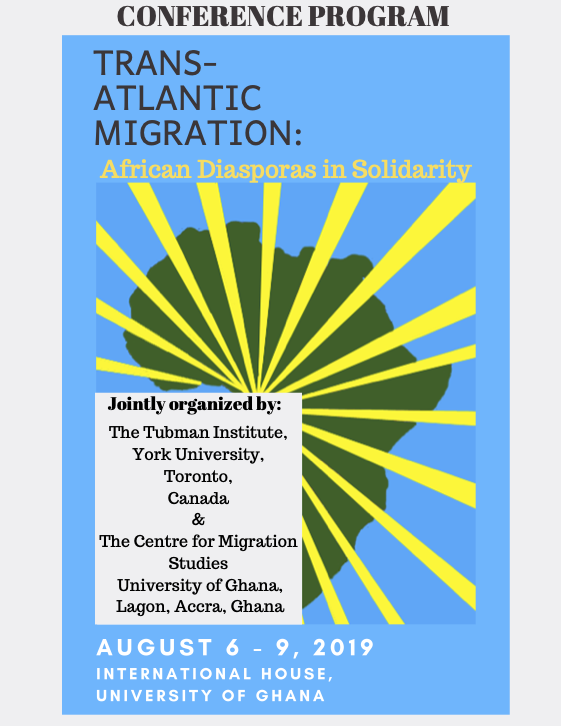
Conference General Co-Chairs: Professor Gertrude Mianda (Harriet Tubman Institute, York University, Toronto) & Joseph Teye (Center for Migration Studies, University of Ghana, Accra)
Conference Program Co-Organizers: Prof. Joseph Mensah (York University) & Dr. Leander Kandilige (CMS, Univ. of Ghana)
Conference Co-Treasurers: Dr. Mary Setrana (CMS) & Dr. Jeffery Squire (York University)
Conference Publicity Coordinator: Dr. Sylvia Bawa (York University)
Steering Committee Members:
Prof. Gertrude Mianda, Harriet Tubman Institute, York University, Canada
Prof. Joseph Teye, Center for Migration Studies (CMS), University of Ghana
Prof. Joseph Mensah,York University
Dr. Jeffrey Squire, York University
Dr. Leander Kandilige, CMS, University of Ghana
Dr. Sylvia Bawa, York University
Dr. Mary Setrana, CMS, University of Ghana
Dr. David Firang, Trent University, Peterborough, ON. Canada
Dr. Roger Oppong Koranteng, Head, Public Sector Governance, Commonwealth Secretariat, London, UK
Ambassador Emmanuel Enos, Ghana Ambassador to The State of Qatar
The keynote by Dr. Hanétha Vété-Congolo (Bowdoin College) and Dr. Pablo Idahosa’s (York University) closing remarks for the Transatlantic Memories, Blackness, and African Diasporic Identity: Now and in the Future International conference are now available on YouTube.
HTI organized this two day event on 11–12 May 2022 to mark the International Decade for People of Africa Descent, and in consideration of the ongoing struggles of African peoples, including those in diasporic communities.
To mark the International Decade for People of Africa Descent, and in consideration of the ongoing struggles of African peoples, including those in diasporic communities, the Harriet Tubman Institute is organizing a virtual interdisciplinary conference on Wednesday and Thursday, 11–12 May 2022.
Dr. Hanétha Vété-Congolo will give the conference keynote lecture on Africa Tomorrow: Building Modernity, Economic Wealth, and Human Freedom and Dignity Through Knowledge on 11 May 2022 at 09:00 EDT. Professor Vété-Congolo is the Henry Wadsworth Longfellow Professor of Romance Languages and Literatures, Bowdoin College; President, Caribbean Philosophical Association.
Watch Dr. Vété-Congolo's keynote at this link
African Studies and Development Studies scholar Dr. Pablo Idahosa (York University) will offer closing remarks—Within and Beyond the Faultlines of Black Atlanticism—on 12 May 2022 at 16:30 EDT. Watch Dr. Idahosa's remarks at this link.
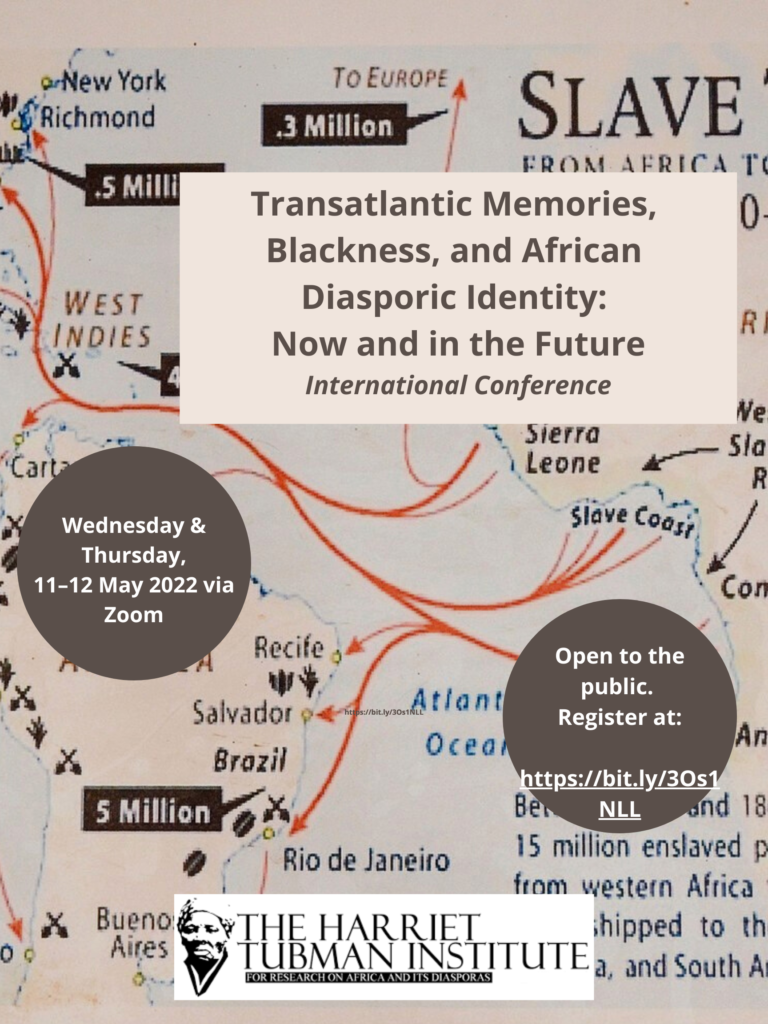
Panels
- Diasporic Identity Formations and the Continent
- Histories and Geographies of Blackness
- Migration (African and Caribbean) and Blackness in Canada
- Blackness and the Performing Arts (Music, Film, Theatre and Visual Arts)
- Space and Black Bodies (Historical, Contemporary Occupation)
- Memory/Memories: Blackness and the Performing Arts
- Histories and Geographies of Blackness
- Moving Forward: Africa and Diasporic-African Futures
- Within and Beyond the Faultlines of Black Atlanticism
The conference program is available at this link.
For more information: tubman@yorku.ca.
